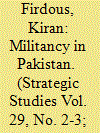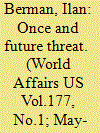|
|
|
Sort Order |
|
|
|
Items / Page
|
|
|
|
|
|
|
| Srl | Item |
| 1 |
ID:
125582


|
|
|
|
|
| Publication |
2013.
|
| Summary/Abstract |
Since coming to power in early June, the government of Nawaz Sharif has struggled to deal with the challenges posed by pro-Taliban militants, Salman Masood reports from Islamabad on the Pakistani prime minister's troubled inheritance.
|
|
|
|
|
|
|
|
|
|
|
|
|
|
|
|
| 2 |
ID:
132214


|
|
|
|
|
| Publication |
2014.
|
| Summary/Abstract |
Militant organizations pursue two common aims: to survive and to achieve the goals that define their raison d'être. Yet, elements that sustain the life spans of militant organizations are not necessarily the same components that advance the accomplishment of their core, or "outcome," goals. Further, some organizational practices, such as the use of suicide attacks, generate a tradeoff that bolsters survivability while detracting from the effective pursuit of outcome goals. This study demonstrates that three operating conditions explain variation in the duration and achievement of contemporary militant organizations: receptiveness to tradeoffs, levels of external support, and the nature of adversaries. As such, the unique effects of different operating conditions reveal why many militant organizations survive for long periods of time but only a few achieve the goals that justify their existence.
|
|
|
|
|
|
|
|
|
|
|
|
|
|
|
|
| 3 |
ID:
092285


|
|
|
| 4 |
ID:
130251


|
|
|
|
|
| Publication |
2014.
|
| Summary/Abstract |
Is al-Qaeda really on the run? Since the death of Osama Bin Laden, the Obama administration has actively promoted the narrative that it has gained the upper hand in its struggle with the world's most dangerous terrorist group. The president himself, as well as a variety of other US officials, have insisted time and again that al-Qaeda is "decimated" and on a "path to defeat." But reports of the terror group's death, to borrow a phrase from Mark Twain, have been greatly exaggerated. Although it suffered considerable operational setbacks over the past decade, al-Qaeda has proven both adaptive and resilient. Today, its two principal offshoots pose growing challenges to stability in North Africa and the southern Persian Gulf. The changing organization now sees growth opportunities in the deepening civil war in Syria, growing disorder in post-Saddam Hussein Iraq, lawlessness in the Sinai Peninsula, and the impending US withdrawal from Afghanistan. In all of these hot spots it is looking to expand its franchises and threaten US interests. Moreover, as a result of America's progressive disengagement from the Middle East and North Africa, al-Qaeda is poised to discover still greater room for maneuver in the years ahead.
The most important fact about al-Qaeda is that it is an evolving organization, far different from the one that carried out the attacks of September 11, 2001. The years since then have seen its forces significantly eroded in Afghanistan, where coalition operations succeeded in whittling away at the core group of militants that made up what can be called al-Qaeda "central." In the summer of 2010, then CIA Director Leon Panetta estimated there were just fifty to one hundred al-Qaeda fighters in the group's country of origin. A similar number was reported to be operating in Afghanistan by a coalition general last year.
|
|
|
|
|
|
|
|
|
|
|
|
|
|
|
|
| 5 |
ID:
127788


|
|
|
|
|
| Publication |
2014.
|
| Summary/Abstract |
Research on violent mobilization broadly emphasizes who joins rebellions and why, but neglects to explain the timing or nature of participation. Support and logistical apparatuses play critical roles in sustaining armed conflict, but scholars have not explained role differentiation within militant organizations or accounted for the structures, processes, and practices that produce discrete categories of fighters, soldiers, and staff. Extant theories consequently conflate mobilization and participation in rebel organizations with frontline combat. This article argues that, to understand wartime mobilization and organizational resilience, scholars must situate militants in their organizational and social context. By tracing the emergence and evolution of female-dominated clandestine supply, financial, and information networks in 1980s Lebanon, it demonstrates that mobilization pathways and organizational subdivisions emerge from the systematic overlap between formal militant hierarchies and quotidian social networks. In doing so, this article elucidates the nuanced relationship between social structure, militant organizations, and sustained rebellion.
|
|
|
|
|
|
|
|
|
|
|
|
|
|
|
|
|
|
|
|
|